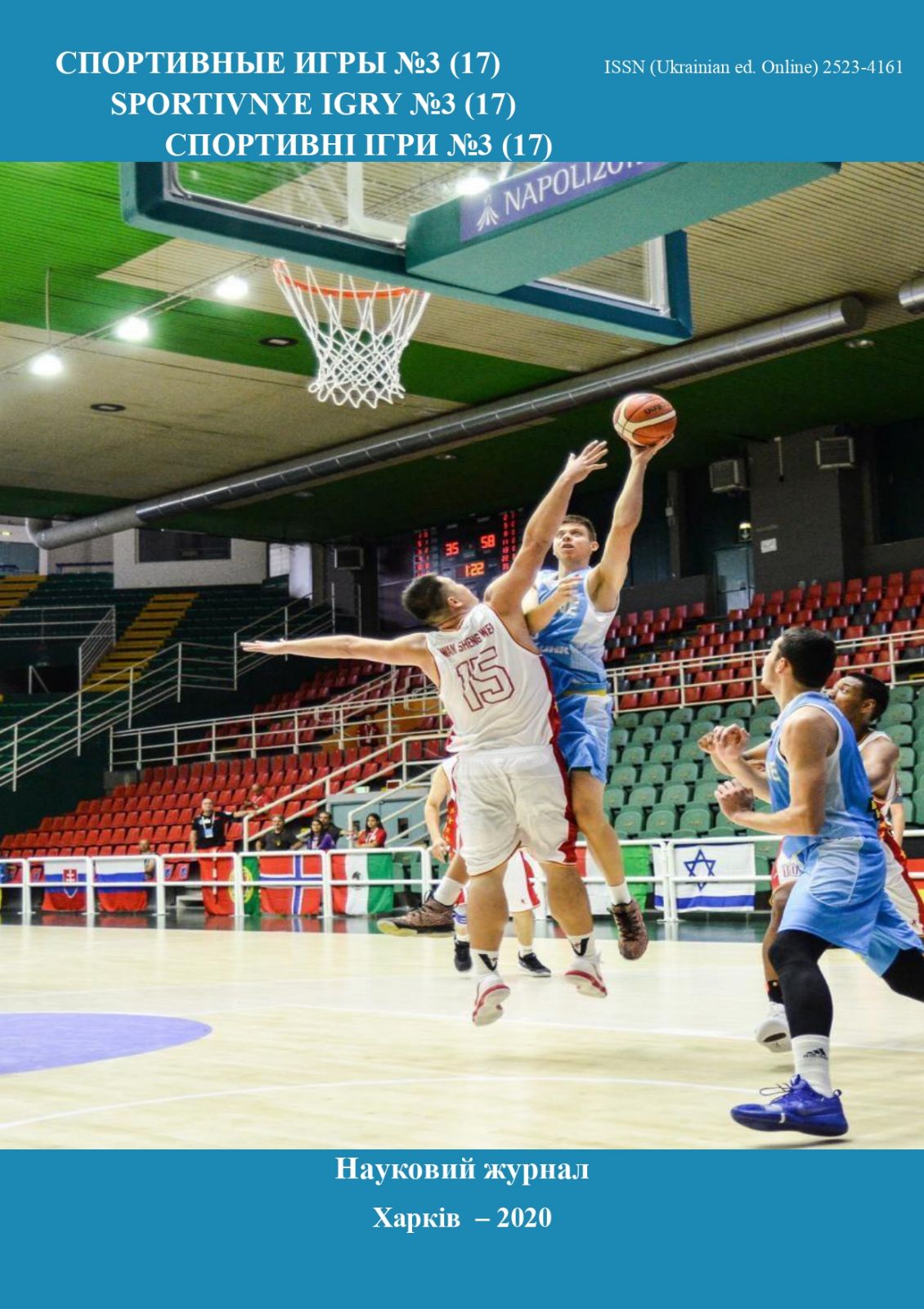Sports games in the professional becoming of students
DOI:
https://doi.org/10.15391/si.2020-3.04Keywords:
sports games, physical education, physical and psychophysiological qualitiesAbstract
It
is stated that in order to provide an effective development of the physical education system as well as
the preparation of students for future professional engagement, it is necessary to strengthen the
quality of the educational process with professionally applied physical training. One of the ways to
improve the PAPT process is the formation of new approaches using popular sports games that
contribute to the development of physical and psychophysiological qualities required for future
professional engagement. A goal of the research is to determine а motivation of students to play
sports games, as well as peculiarities of the influence of the sports games on the development of
professionally important physical and psychophysiological qualities in the learning process of
students. Material and research methods. In order to determine the motivation of students of the 1-
4 years of study who want to be involved in sports games, there was used a questionnaire method.
Apart from that, in order to determine the efficiency of the impact of sports games on the
development of professionally important physical and psychophysiological qualities, there has been
conducted a study of three groups of athletes involved in various sports and a group of experts of
economic majors сonsisting of 15 people, whose work experience exceeded 10 years. The group of
students involved in basketball consisted of 12 people, those involved in volleyball of 14 people and
those involved in soccer of 11 people. In order to determine the test results of physical activity, the
following exercises have been used: bent suspension, raising the body from a prone lying position,
cross movements with arms. Automatic logging of psychophysiological tests namely: a simple visual-motor reaction, a visual-motor choice-point behavior, and the number of typed characters according
to the Stamina test was carried out on the computer diagnostic complex NS - Psychotest. A criterion
used for assessing the positive impact of playing sports games was the comparison of the obtained
indicators on the physical and psychophysiological training of students involved in playing sports
with the test results of experts in economic fields. Results. A comparative analysis of the final test
results of the physical and psychophysiological qualities of students involved in sports games with
the experts of the economic fields, strongly suggests that it is appropriate to use sports games in
preparation for future professional engagement. Resume. The article determines the positive
dynamics of changes in indicators of students’ engagement involved in playing sports games in
higher education institutions. The number of students who want to play badminton has increased by
1.36% compared to the academic year of 2018, basketball - by 5.18%, volleyball - by 4.53%,
handball - by 1.89%, the number of people who want to play soccer - increased by 10.58%. A
comparative analysis of the results of the study of the physical and psychophysiological training of
students involved in sports games with the model results of the different experts makes it possible to
assert the expediency of using sports games and their elements in the process of physical education
of students, and in a high-quality professional training of future experts of economic majors.
References
Бойчук, Р.І., Ковцун, В.І., Короп, М.Ю., & Бєлявський, І.Л. (2017). Спортивні ігри в системі професійно-прикладної фізичної підготовки майбутніх фахівців нафтогазової справи. Вісник Чернігівського національного педагогічного університету імені Т. Г. Шевченка.
Серія: Педагогічні науки. Фізичне виховання та спорт, (143), 259-262.
Горобей, М.П., Чалий, О.С., Дерябкина, Т.В., & Самійленко, В.П. (2018). Спортивні ігри як важливий компонент здорового способу життя студентів. Проблеми і перспективи розвитку спортивних ігор і єдиноборств у вищих навчальних закладах, 2, 9-11.
Грибан, Г.П. (2014). Особливості фізичної підготовленості студентів вищих навчальних закладів України. Вісник Чернігівського національного педагогічного університету,1(118), 88-92.
Дорохова, О.В., & Березовський, В.А. (2019). Спортивні ігри – ефективна форма фізичного виховання студентської молоді. Науковий часопис НПУ імені М. П. Драгоманова,3К (110), 181-184.
Дубинська, О. Я. (2014). Удосконалення засобів професійно-прикладної фізичної підготовки для студентів економічних спеціальностей. Матер. XIV Міжнар. наук.-практ. конф. молодих учених. – Суми: СумДУ ім. АС Макаренка, 1, 67-71.
Дяченко, А.А., Асаулюк, І.О., & Маринчук, П.І. (2017). Професійно-прикладна фізична підготовка студентів закладів освіти. Зб. наукових праць. Переяслав-Хмельницький, 11 (31), Ч. 3, 90-93.
Круцевич, Т.Ю., & Пангелова, Н.Е. (2016). Сучасні тенденції щодо організації фізичного виховання у вищих навчальних закладах. Спортивний вісник Придніпров’я, 3, 109-114.
Лутченко, Н.Г., Перевозникова, Н.И., & Григорьев, Н.Н. (2016, February). Основные приоритеты и значение спортивных игр в профессиональном обучении студенческой молодежи. Физическая культура и здоровье студентов вузов: материалы XII Междунар. науч.-практ. конф., 12, 86-88.
Остапенко, Ю.О. (2015). Професійно-прикладна фізична підготовка студентів інформаційнологічної групи спеціальностей. (Дис. канд. физ. виховання та спорту). НУФВіС України, Київ.
Остапенко, Ю. О., & Остапенко, В. В. (2019). Спортивні ігри як засіб підготовки фахівців інформаційно-логічної групи спеціальностей Науковий часопис НПУ імені М. П. Драгоманова, 3(110), 425-429.
Помещикова, І.П., Кадигроб, Я.Г., Коваль, М.В., & Мальцева, Т.Н. (2016). Вплив рівня функцій уваги на ігрові показники баскетболістів 12-13 років. Спортивні ігри, 2, 44-46.
Пилипей, Л.П. & Шаповал, М.С. (2013). Стан фізичної підготовленості студенток I курсу ВНЗ. Спортивний вісник Придніпров’я, 2, 57-61.
Пустулякова, Л.М., Болгар, М.А., & Павліченко, С.В. (2014). Спортивні ігри як активний метод формування професійно-прикладних якостей майбутніх медиків на заняттях з фізичного виховання зі студентами медичного ВНЗ. Спортивні ігри, 10, 32-35.
Футорний, С.М., & Рудницький О. В. (2013). Характеристика стану здоров’я студентів вищих навчальних закладів. Теорія і методика фізичного виховання і спорту, 2, 99-105.
Iermakov, S., Kozina, Z., Ceslitska, M., Mushketa, R., Krzheminski, M., & Stankevich, B. (2016).
Razrabotka kompyuternyih programm dlya opredeleniya psihofiziologicheskih vozmozhnostey i svoystv nervnoy sistemyi lyudey s raznyim urovnem fizicheskoy
aktivnosti. Zdorov’â, sport, reabìlìtacìâ, 1, 14-19.
Hopper, C., Fisher, B., & Munoz, K. (2008). Physical activity and nutrition for health. Champaign: Human Kinetics, 374.











